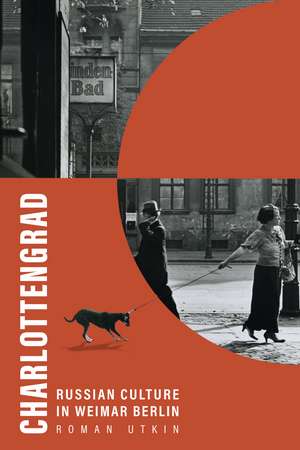Charlottengrad: Russian Culture in Weimar Berlin
Autor Roman Utkinen Limba Engleză Hardback – aug 2023
By closely examining the intellectual output of Charlottengrad, Roman Utkin explores how community members balanced their sense of Russianness with their position in a modern Western city charged with artistic, philosophical, and sexual freedom. He highlights how Russian authors abroad engaged with Weimar-era cultural energies while sustaining a distinctly Russian perspective on modernist expression, and follows queer Russian artists and writers who, with their German counterparts, charted a continuous evolution in political and cultural attitudes toward both the Weimar and Soviet states.
Utkin provides insight into the exile community in Berlin, which, following the collapse of the tsarist government, was one of the earliest to face and collectively process the peculiarly modern problem of statelessness. Charlottengrad analyzes the cultural praxis of “Russia Abroad” in a dynamic Berlin, investigating how these Russian émigrés and exiles navigated what it meant to be Russian—culturally, politically, and institutionally—when the Russia they knew no longer existed.
Preț: 588.69 lei
Preț vechi: 764.54 lei
-23% Nou
Puncte Express: 883
Preț estimativ în valută:
112.66€ • 122.33$ • 94.63£
112.66€ • 122.33$ • 94.63£
Carte tipărită la comandă
Livrare economică 23 aprilie-07 mai
Preluare comenzi: 021 569.72.76
Specificații
ISBN-13: 9780299344405
ISBN-10: 0299344401
Pagini: 292
Ilustrații: 22 b-w illus.
Dimensiuni: 152 x 229 x 23 mm
Greutate: 0.51 kg
Ediția:First Edition
Editura: University of Wisconsin Press
Colecția University of Wisconsin Press
ISBN-10: 0299344401
Pagini: 292
Ilustrații: 22 b-w illus.
Dimensiuni: 152 x 229 x 23 mm
Greutate: 0.51 kg
Ediția:First Edition
Editura: University of Wisconsin Press
Colecția University of Wisconsin Press
Notă biografică
Roman Utkin is an associate professor of Russian, East European, and Eurasian studies as well as feminist, gender, and sexuality studies at Wesleyan University, specializing in twentieth- and twenty-first-century Russian culture, literature, and society.
Cuprins
List of Illustrations
Acknowledgments
Note on Transliteration and Translation
Introduction
1. Unsentimental Journeys: Berlin as Trial Emigration
2. Guides to Berlin: Exiles, Émigrés, and the Left
3. Performing Exile: The Golden Cockerel at the Berlin State Opera
4. Nabokov, Berlin, and the Future of Russian Literature
5. Queering the Russian Diaspora
Conclusion
Appendix: The Russian Poets Club Meeting Minutes, Berlin, 1928
Notes
Bibliography
Index
Acknowledgments
Note on Transliteration and Translation
Introduction
1. Unsentimental Journeys: Berlin as Trial Emigration
2. Guides to Berlin: Exiles, Émigrés, and the Left
3. Performing Exile: The Golden Cockerel at the Berlin State Opera
4. Nabokov, Berlin, and the Future of Russian Literature
5. Queering the Russian Diaspora
Conclusion
Appendix: The Russian Poets Club Meeting Minutes, Berlin, 1928
Notes
Bibliography
Index
Recenzii
“[A] thought-provoking study. . . . A fresh approach to diaspora studies.”
“Illuminating. . . . [An] ambitious and wide-ranging study. . . . Utkin provides a fresh and multifaceted view of a diverse community that has hitherto been treated for the most part homogenously.”
“[A] revealing portrait of this community. . . . Utkin demonstrates the meaningful engagement of Russians with the landscape of the city, and his highlighting of the hybridity and ambivalence of the Russian community makes it a welcome addition to the scholarships on Russia abroad and Weimar Berlin alike.”
“Excellent. . . . A valuable book for historians and literary specialists, particularly for the ways that it geographically decenters postrevolutionary culture and unsettles political ideas about the disparity between revolutionary and reactionary thought.”
“Utkin digs deep into the world of Russian Berlin, a liminal site that allowed Russian artists displaced by the Bolshevik Revolution to begin to imagine what emigration might mean. He reminds us of the fluidity of the historical moment and the diverse choices Russian creators made. A unique and significant study.”
“A groundbreaking book—an innovative, compelling, and important contribution to the study of Russian and Russophone cultural life during the interwar era. This is a bold and necessary corrective to narratives concerning global Russian culture in the postrevolutionary period.”
“A piece of rigorous cultural history. It pursues refreshing new meanings while applying traditional tools of literary and visual analysis to familiar texts and artefacts and covers new archival material. . . . [A] conceptually innovative project.”
Descriere
Charlottengrad examines the Russian émigré and exile community that found itself in Berlin during the first wave of emigration after the 1917 Revolution brought the tsarist government of Russia crashing down. Roman Utkin shows that the idea of a community aligned with Imperial Russia and hostile to the new Soviet government is far too simplistic. By closely studying the intellectual output of some of the hundreds of thousands of Russian émigrés ensconced in Berlin’s Charlottenburg neighborhood, Utkin reveals a picture of some of the world’s first “stateless” peoples struggling to understand their new identity as emigrants and exiles, balancing their sense of Russianness with their position in a modern, bustling Western city, and navigating their political and personal positionality toward a homeland that was no longer home.
